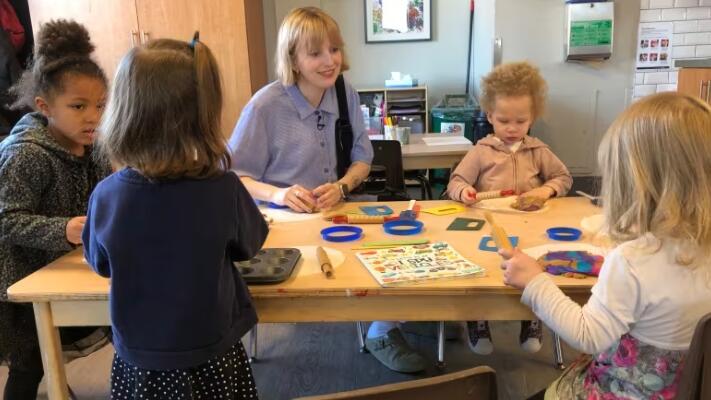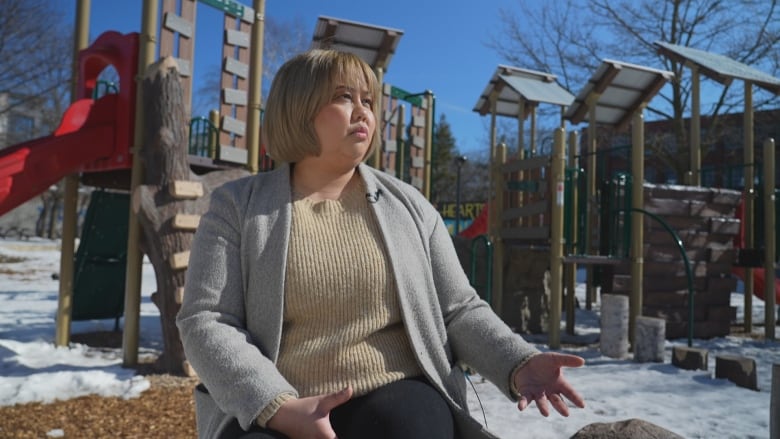Why a shortage of workers threatens $10/day child care

‘It’s the worst workforce crisis child care has ever faced,’ says an advocate
Agencies that run daycares say they’re so short of early childhood educators that they doubt the national program of $10-a-day child care can be delivered to all the kids who will need a spot.
Stories abound of daycare centres running at half capacity, asking parents to take their kids out of care for a day or two a week, or even shutting down operations entirely, all for lack of staff.
The Trudeau government is promising to give all families in Canada access to high quality child care at an average price of $10 per day. Its plan calls for creating 250,000 new child-care spots by 2026.
But the shortage of people willing to work in the system is putting that plan in significant jeopardy, says Carolyn Ferns, policy coordinator at the Ontario Coalition for Better Child Care.
“It’s the worst workforce crisis child care has ever faced,” said Ferns in an interview.
“We’ve had recruitment and retention issues in child care for years before the pandemic, but it’s just gotten so much worse.”
While pandemic disruption of the labour market is a factor, child-care advocates say the root causes involve poor wages and benefits, giving workers little incentive to stay in the sector.
For parents, the staffing crisis threatens to make the already long wait for a daycare spot even longer.
- Child-care costs are down across Canada, but a shortage of spaces, staff persists
- How the $10-a-day child-care deals will work in your province or territory
“What we’re going to see is huge wait lists, ballooning wait lists, because child-care programs can’t staff,” said Ferns.
The biggest provider of child care in the Toronto region, the YMCA, has so few staff that it currently has just 16,000 kids enrolled in its 35,000 licensed spaces.
“That means 19,000 kids and families that don’t get access to care,” said Jamison Steeve, chief strategy officer for the YMCA of Greater Toronto. “Our wait lists, it’s not a point of lack of spaces, lack of capital, it’s lack of people to provide the care.”
The YMCA needs about 1,400 workers to get back to its pre-pandemic capacity in child care, said Steeve, and would need hundreds more staff beyond that to expand to meet the expected increase in demand for the $10-a-day program.
Steeve won’t go so far as to say the worker shortage jeopardizes the national daycare program, but does say it threatens the vision of making affordable, high quality daycare accessible to all parents.
“We will be able to provide $10-a-day child care, but not to the numbers that the plan currently calls for,” he said.
- Government officials estimate Ontario could be short 8,500 early childhood educators
“We have raised the alarm in our pre-budget submissions with both the federal and the provincial governments that this is something they need to turn their eyes to.”
Karina Gould, the federal minister for families, children and social development, says having a large enough qualified workforce to staff the child-care program will be a huge challenge.
“I hear those concerns, I certainly worry about them, but I also know that we’re at the very beginning of this journey and I’m really excited about where we’re going with it,” Gould said in an interview.
“I have confidence in the provinces’ and territories’ ability to get this done.”

The Ontario government forecasts that nearly 15,000 additional early childhood educators are needed to staff the 86,000 new child-care spaces planned for the province by 2026, according to official documents obtained by The Canadian Press.
“If we really want to expand this program to the 86,000 spots that were promised, things will actually have to be transformed completely, and that has to begin with the workers,” said Jess Tomas, a community organizer for the Association of Early Childhood Educators of Ontario.
- As child care expands in Ontario, advocates wonder who will staff those spaces
- Raise their pay or face shortage of workers to staff Ontario’s new daycare spaces, advocates warn
“As much as you build these child-care centres, if there are no ECEs to staff them, those are empty rooms,” Tomas said
In British Columbia, a recent report from the Early Childhood Educators of B.C. found nearly half of all child-care employers to be losing more staff than they could hire.
Jenn Carman, early years manager at À:lmèlhàwtxw Early Education Centre in Chilliwack, B.C., says her facility has just half the number of children it has space for.
Carman questions the wisdom of governments announcing that they’re building new child-care spaces when workers aren’t available to staff existing ones.

“Those staff have to come from somewhere else. They’re not just growing on trees,” said Carman in an interview.
“Every new centre that opens, every new centre that gets renovation money to create more spaces, they seem to be either sitting empty or sitting not at capacity, because of staffing,” she said.
Elsewhere in Canada:
- The group Child Care Now Alberta says thousands of qualified early childhood educators left the sector during the COVID-19 pandemic and says the government has not adequately addressed the workforce crisis.
- Nova Scotia created just 400 of 1,500 new child-care spots it promised by the end of 2022, and the government said a labour shortage was partly to blame.
- The Manitoba Child Care Association estimates the province will need an additional 3,000 early childhood educators to fulfill the expect demand for the $10 per day program.
Martha Friendly, executive director of the Childcare Resource and Research Unit, a policy think-tank in Toronto, says both federal and provincial governments need to get involved to address the challenge.
“It’s a cross-Canada problem, and it should be tackled that way,” Friendly said in an interview. “I would really like to see a national workforce strategy.”
-
AUDIO
‘We’re not glorified babysitters’: Ontario child care workers push for higher pay
Having a supply of qualified early childhood educators is key to getting a Canada-wide child-care system off the ground, says Friendly.
“In the whole child-care world, including amongst government officials, I think there’s clear recognition how important it is to solve the workforce issue, which is why I’m surprised that there hasn’t been much more really serious attention to it.”
Related News
Trump trips, a fake video and 10 possible co-conspirators – Takeaways from new Epstein files
The US Department of Justice released its latest – and largest – tranche of JeffreyRead more
Military considers permanent bases in Latvia as part of Canada’s NATO commitment
Prime Minister Mark Carney visited Latvia’s Adazi military base in August and announced an extensionRead more
